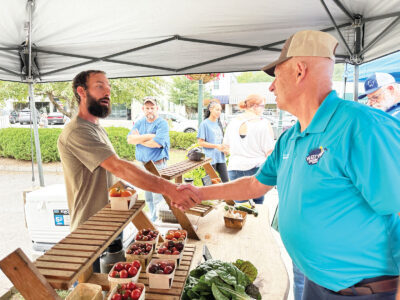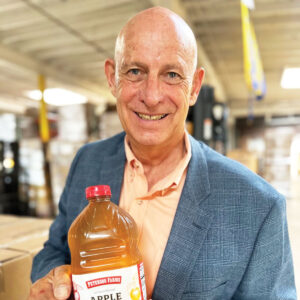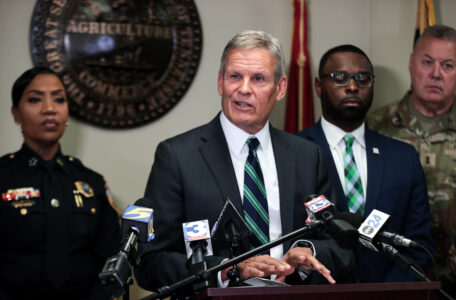A Time to Plant: West Virginia Agriculture Commissioner Leonhardt maintains farming traditions
- Agriculture Commissioner Kent Leonhardt, right, visits the White Sulphur Springs Farmers Market in August during National Farmers Market Week. (Photo courtesy of the WV Department of Agriculture)
- Agriculture Commissioner Kent Leonhardt visits the Facing Hunger Foodbank in Huntington in June as a pallet of apple juice from Peterson Farms arrives. (Photo courtesy of the WV Department of Agriculture)
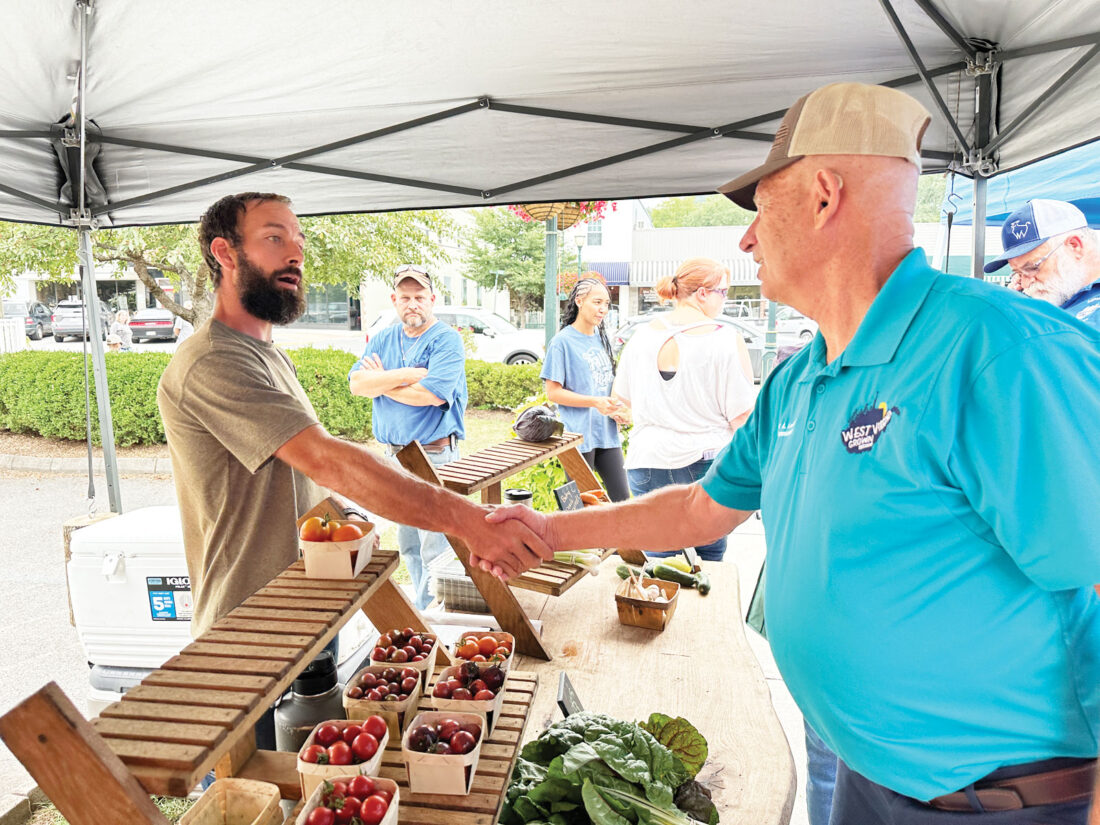
Agriculture Commissioner Kent Leonhardt, right, visits the White Sulphur Springs Farmers Market in August during National Farmers Market Week. (Photo courtesy of the WV Department of Agriculture)
GUTHRIE, W.Va. — The farmer is part of West Virginia’s identity and DNA. West Virginia’s state flag and great seal includes a farmer. Drive down any state highway and you’ll pass acres of farmland or pastures of cattle.
For the men and women at the West Virginia Department of Agriculture, maintaining and lifting up the state’s farming tradition is job number one. From protecting residents from food-borne illnesses and testing for animal illnesses, to promoting West Virginia-made food products and farm-to-table dinners at state parks, the mission of the Department of Agriculture is rooted in tradition but also adapting to the times.
Agriculture Commissioner Kent Leonhardt is now in his ninth year leading the nearly 350 employees of the Department of Agriculture, serving in his third and final four-year term.
“We like to say that we touch the lives of every West Virginia and every day, and they don’t even know we exist,” Leonhardt said in an interview Wednesday at the department’s headquarters at the Gus. R Douglass Agricultural Center at Guthrie, right outside of Sissonville in Kanawha County.
A retired Marine Corps lieutenant colonel, Leonhardt settled down on a farm in Monongalia County. After running — and losing — as a Republican candidate for agriculture commissioner in 2012 to the late agriculture commissioner Walt Helmick, Leonhardt ran for the Senate himself. He spent half of one term representing the 2nd District, spanning from Marshall and Monongalia counties in the north to Calhoun and Gilmer counties in the south. In 2016, he challenged Helmick again and won.
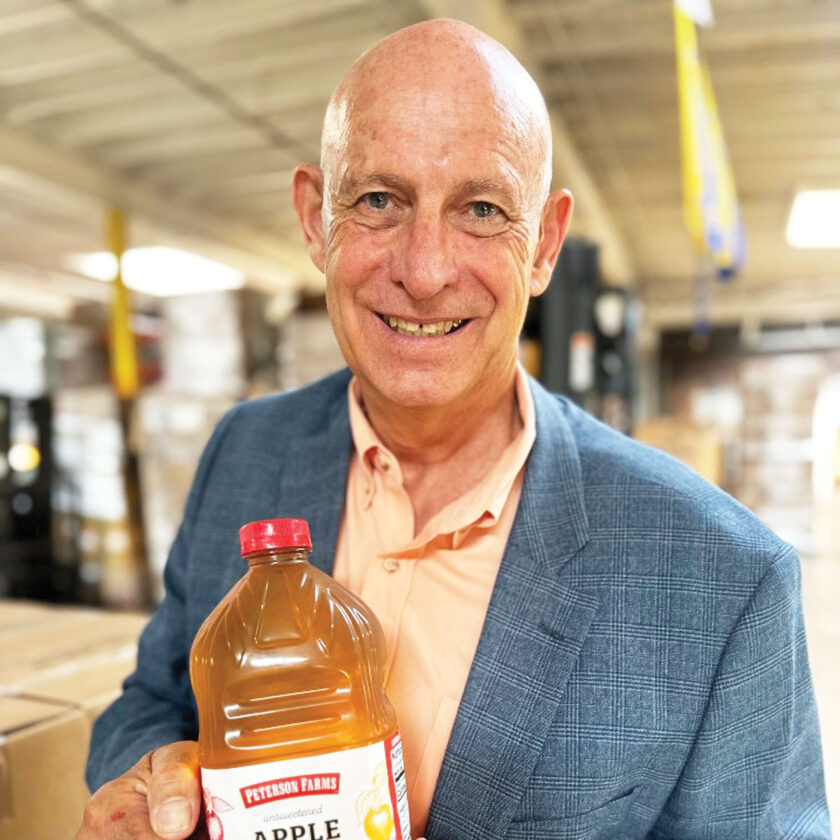
Agriculture Commissioner Kent Leonhardt visits the Facing Hunger Foodbank in Huntington in June as a pallet of apple juice from Peterson Farms arrives. (Photo courtesy of the WV Department of Agriculture)
Leonhardt has easily won re-election in 2020 and 2024, but his third term will be his last, announcing during the 2024 election that he would not seek a fourth term in 2028.
Despite facing several challenges over the last five years, Leonhardt said West Virginia’s agricultural economy has overcome. Leonhardt cited statistics showing a 27% increase in agriculture output between 2017 and 2022 despite the COVID-19 pandemic hitting the state, nation and world between 2020 and 2022.
“We kept agriculture moving through COVID when a lot of other states shut it down,” Leonhardt said. “And while we had shortages on the shelves on certain things, we were actually doing better than other states because we had started thinking about local food. We were talking about local fresh foods for the health of our citizens way before this current presidential administration was talking about it. And we had already tripled farmers’ markets, so that access was available.”
Leonhardt said state farmers also managed well during recent avian influenza outbreaks, being one of two states not having to destroy commercial flocks of poultry. Proactive testing by Department of Agriculture staff and regulators helped limit infections to backyard flocks.
“Some of that’s luck, but some of that is also the work of the animal health staff going out, teaching biosecurity, and talking to the farmers,” Leonhardt said. “We did hundreds of thousands of tests, even on backyard flocks. And we only had two backyard flocks infected. The disease was contained. I’m very proud of the animal health staff in the Department of Agriculture.”
The 2024 drought was also a challenge for West Virginia farmers. According to the U.S. Drought Monitor, nearly the entire state was labeled D3 for extreme drought. Several central and southern West Virginia counties were categorized as D4 for exceptional drought.
Due to better winter conditions and a rainy spring and early summer, many West Virginia counties were able to come out of their severe drought conditions. But with a dry last half of summer, 10 counties have since been upgraded to D3 drought conditions. Leonhardt said he is already working with the U.S. Department of Agriculture, other federal partners, and state officials to make resources available to farmers.
“I’ve alerted the Governor’s Office as to the programs we did last year, and I’m very grateful for the Legislature for coming up with $10 million for our past year renovation program,” Leonhardt said. “I’ve put out some press releases on recommendations already, including how to save pastureland. So, that funding that last year is certainly helping prepare for this year.
“We had a little bit left over, and that’s been pushed back out to the conservation districts to help with water resources, and that’s going to help with this drought,” he continued.
The Department of Agriculture works with the state’s two large foodbanks – Mountaineer Food Bank and the Facing Hunger Foodbank – and other food banks, which help provide food to those in need. The department has a Food Distribution Program, which delivers food to school systems. The Emergency Food Assistance Program makes healthy food available to food banks and other agencies.
Those programs rely on data from the USDA’s Household Food Security Report, which tracks the public’s access to food and groceries. But Saturday, the USDA announced it was doing away with the annual report, calling it “redundant” and “liberal fodder.”
“Let me just be clear that the announcement Saturday by the U.S. Department of Agriculture was not coordinated with the West Virginia Department of Agriculture in any way, shape, or form,” Leonhardt said. “That was a decision made out of Washington. It surprised me a little bit.”
Leonhardt said he recently talked with administrators of the USDA’s National Agriculture Statistics Service raising concerns about other cuts in data services programs that farmers and the Department of Agriculture rely on. Changes in agriculture data could also affect how much federal funding West Virginia receives.
“I’m very concerned with some of the loss of statistics. We use that in West Virginia,” Leonhardt said. “I need those figures in order to tell the Legislature what’s happening in West Virginia. It’s very important for the funding. And then I think on the national level, they use those figures for the allocation of federal dollars to the states.”
The Department of Agriculture is working with several groups on the issue of food insecurity and healthy food access, such as the West Virginia Food is Medicine Coalition and FARMacy WV. These programs offer access to fresh produce and ingredients, cooking demonstrations and classes, and health education and metrics tracking.
According to FARMacy WV, their 15-week program shows demonstrable decreases in A1c and cholesterol, while also empowering people to take their health and wellbeing into their own hands.
“We’re seeing that food can be medicine, food can be a prescription, and we’re seeing tremendous results in reducing A1c diabetes and people coming off medications after only 15 weeks. We hope after the 15 weeks, they learn to take what they learned during these programs…We’re seeing that improvement. I hope they follow through on it.”
Agribusiness and agritourism also continues to improve in West Virginia. The nearly 40-year-old West Virginia Grown program was revamped and rebranded under Leonhardt. Products with the West Virginia Grown label must be grown in West Virginia or have 50% of their ingredients or product value sources from within the state. The West Virginia Grown program boasts more than 500 members.
West Virginia Grown products are highlighted every year at the State Fair of West Virginia, where the Department of Agriculture operates the Country Store.
“We had record sales there again this year,” Leonhardt said. “And that money goes back into our agricultural businesses’ hands, 90% of it does. It’s not like a regular store where they’re selling wholesale. They’re getting almost full retail. So, it’s helping them boost their businesses and we’ve gotten a lot of compliments.”
The Department of Agriculture had a role in recruiting Mountaintop Beverage, the manufacturers of shelf-stable dairy products, to Morgantown. The company made a $200 million investment when it opened in 2023 and is preparing for another expansion. Mountaintop Beverage received a $25 million construction loan through the state Economic Development Authority and more than $25 million in funding through the U.S. Department of Agriculture’s Business and Loan Guarantee program.
“This was one of the best economic development announcements for the fewest dollars,” Leonhardt said. “This one was brought to you by the Department of Agriculture. While the Department of Economic Development did have a small hand in it, it was probably one of the smallest outlays of taxpayer dollars for the biggest gain.”
And the Department of Agriculture is working with the state Department of Tourism and the Division of Natural Resources for farm-to-table dinners in West Virginia State Parks, showcasing West Virginia’s farmers and local chefs.
“It is bringing us back to our roots. It’s where people come together,” Leonhardt said. “What we’re seeing with these farm-to-table dinners is that communities and people are coming together. Some go to the same ones year after year and they’re making new friends.”
The Department of Agriculture is also active behind-the-scenes in tourism and outdoor recreation, helping with the health of forests by monitoring for invasive species, or monitoring the health of bodies of water.
“What makes tourism in West Virginia? First, it’s our beauty. It’s our beautiful forests,” Leonhardt said. “Well, who’s responsible for forest health? It’s the plant industry division at the Department of Agriculture. We’re out there constantly monitoring for invasive species, slowing the spread of the spongy moth.
“And then when you talk about our clean water…I chair the state Conservation Committee and work with all the supervisors that the citizens elect throughout the state,” Leonhardt continued. I’m making sure that we have good clean and safe waters as well as the flood control side of things. So, the Department of Agriculture is very much involved in tourism, but we’re kind of the underside of it.”
Steven Allen Adams can be reached at sadams@newsandsentinel.com.

